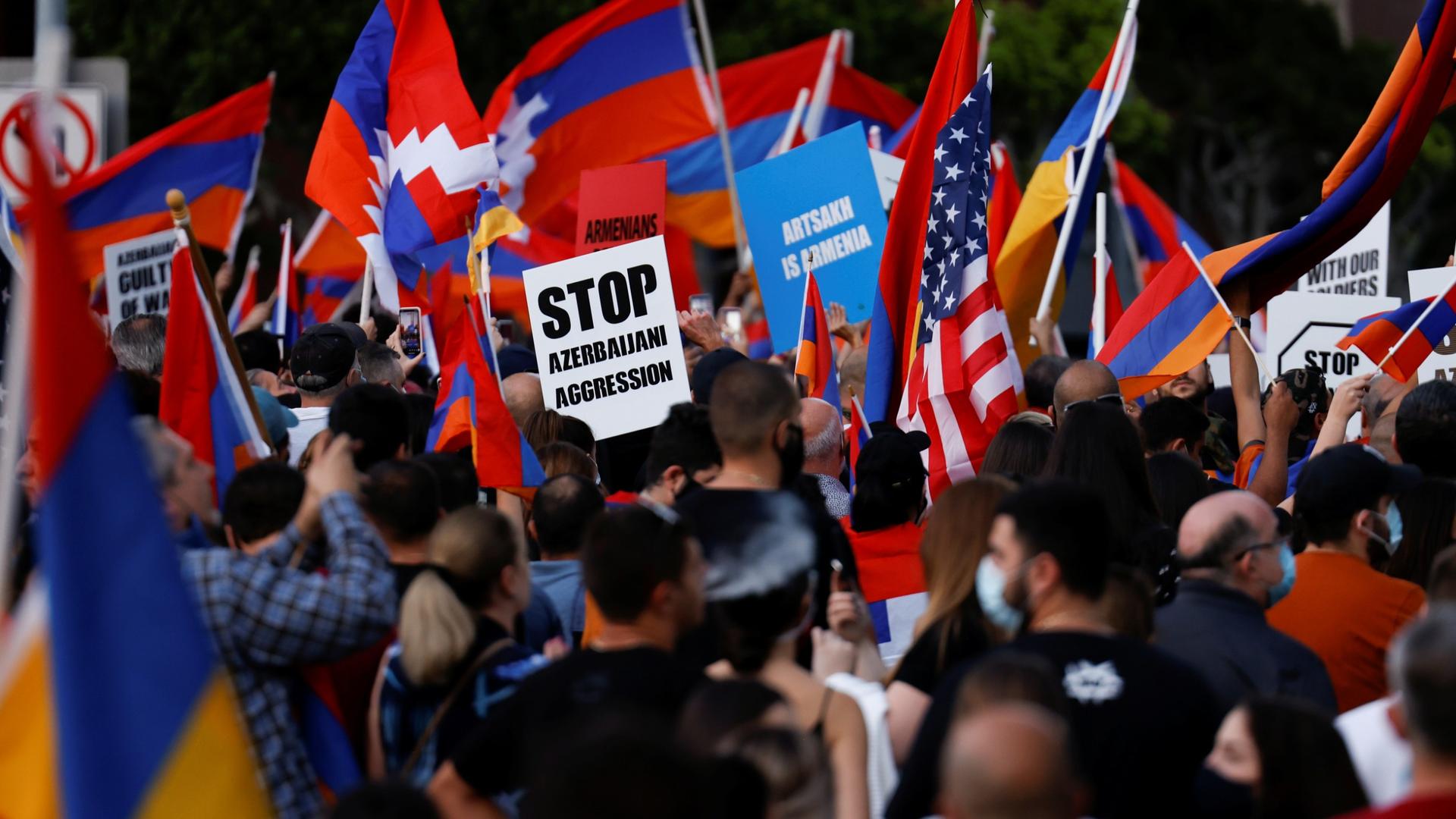Fighting is continuing for the fifth straight day in a part of the world that straddles Europe and Asia. Heavy shelling has taken place between forces from Armenia and Azerbaijan.
Dozens of casualties have been reported since Sunday. The two sides are fighting over land in a disputed region of the Caucasus called Nagorno-Karabakh, which lies within Azerbaijan but has been under the control of ethnic Armenian forces backed by the Armenian government since 1994 at the end of a separatist war.
The major powers in the area, Turkey and Russia, are also getting involved. Meanwhile, the international community is calling for talks to end the decades-old conflict. But leaders of Azerbaijan and Armenia brushed off the suggestion of peace talks Tuesday, accusing each other of obstructing negotiations.
To help make sense of all this, The World’s host Marco Werman spoke with Simon Saradzhyan, director of the Russia Matters Project at the Harvard Kennedy School.
Marco Werman: You were born, I understand, in the Nagorno-Karabakh region, Simon. I think there are a lot of people, including myself, that don’t know much about the area. So can you start by describing it for us?
Simon Saradzhyan: I was born a village which used to be part of the Gyulistan principality of Karabakh, but was carved out and given to Azeri Soviet Republic when the Soviet Union was established. It’s a beautiful area. Some call it the Switzerland of Caucasus: rolling hills, mountains, alpine meadows, fast streams — breathtaking. My heart is always there.
So since Sunday, we’ve seen an outburst of violence in Nagorno-Karabakh. What are the two sides fighting over, and why this most recent outburst?
They’re fighting over what they view as the most precious thing in the world: the land. I’d say that it’s the worst fighting since the ceasefire, and it has the greatest potential to become a regional war because of the involvement of Turkey. That’s not just diplomatic or material support, according to the Armenian side and according to international agencies. [They cite] rebels from Syria who go and fight now against Armenians. So at this time, I only see a path towards further hostilities until external powers with leverage, real leverage, intervene and convince both sides that it’s time to lay down arms and negotiate.
What are the alliances that you’re seeing at play with the Nagorno-Karabakh violence, and what’s at stake for all of them?
The strongest material presence on the ground that is actually involved in combat is the Turkish-Azeri alliance, two nations that describe themselves as one nation, two states. For the first time, we see a foreign power send fighters to the neighborhood which Russia has explicitly called a zone of its privileged interests. Okay, so that’s unprecedented.
That Turkish-Azeri alliance, it sounds really strong. Is it essentially unassailable? And what is Turkey’s intent in getting involved in this conflict?
Turkey’s intent is to attain defeat of the Armenian forces so that Azerbaijan would expand control of land and through that, expand its influence in the South Caucasus region in which it used to compete fiercely with Russia and Iran.
Related: Azerbaijan cuts internet in battle with Armenia
Is there a formula that could lead to another ceasefire? What are you hearing from Western countries?
I’m not privy to discussions among Western diplomats or any diplomats. From what I see, today’s statement by members of the Minsk Group [from the Organization for Security and Co-operation in Europe] is a welcome sign. If they back that statement calling for peace, with signaling that those who refuse to heed the call would be facing real consequences in terms of sanctions, I think that could help to discontinue the fighting. Vis-a-vis the two players, Russia has by far the strongest leverage. So, Russia single-handedly could bring the two countries to discontinue hostilities, as it has done before. But a ceasefire would be achievable, I think.
Who makes up the Minsk Group?
Russia, France and the US.
You said you are not privy to any diplomatic conversations, but do you see energy behind the Minsk Group that could lead to a ceasefire?
The Minsk Group has done its share of work trying to bring the two countries together. But the thing is, the positions have become irreconcilable. On the Armenian side, there’s no way Armenia would agree to Karabakh “returning” to Azerbaijan. On the Azeri side, there’s no way they can see any solution in which Karabakh is not made part of Azerbaijan. So until their positions on that change, there’s not going to be peace no matter what the Minsk Group is, what other formats are used. It’s just not going to work.
As you told us earlier, Simon, you were born in Nagorno-Karabakh. So for you personally, how has this conflict weighed on you and your family and the prospect that it’s going to be hard to end it?
Well, it’s weighing heavily. I mean, I feel for people there. I lost my village to a combined operation of then-Soviet interior troops and Azeri police. Okay, so my village is no more. But all the peaceful people living in Karabakh, I feel for them. And I hope, you know, this situation ends and civilians on neither side suffer anymore. But that’s just my hope. The reality is, unfortunately, different.
This interview has been lightly edited and condensed for clarity.
